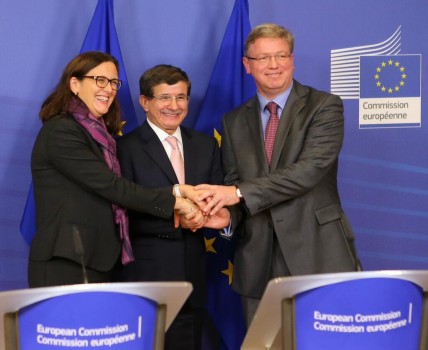Visa-free Europe for Turks ‘in three years’
Davutoğlu signs landmark agreement to accept illegal immigrants ejected from the European Union

EU home affairs commissioner Cecilia Malmstrom, Turkish foreign minister Ahmet Davutoğlu and EU enlargement commissioner Stefan Füle announced the agreement on Wednesday
Turkey and the European Union have struck a landmark deal that could see visa-free travel for Turkish nationals by 2016.
The two sides agreed to sign an agreement that will allow EU governments to send illegal immigrants back if they cross into Europe from Turkey.
In return for this agreement, the EU will start official talks on dropping visa requirements for Turkish passport holders.
Turkey lies on a major route for illegal migration from Africa and the Middle East into Europe, but talks on a “readmission agreement” have stalled in recent years.
“It’s a historic day. We have reached the agreement today,” said Ahmet Davutoğlu, Turkey’s foreign minister, during the joint press conference in Brussels on Wednesday.
“We will officially launch the process of visa freedom on Monday 16 December and will sign the Readmission Agreement.
“Visa exemption for Turkish nationals will be introduced in three and a half years’ time at most, in line with the completion of necessary procedures. But maybe it will be completed much before than this.
The minister added that the migrant readmission deal would operate in parallel.
But EU home affairs commissioner Cecilia Malmstrom, who was standing beside Davutoglu, would not be drawn on a timeframe.
“It is a bit too early to set a date when Turkish citizens will travel freely. Nobody has any reason to delay it, but there is a process that has to go through first,” she said.
Greece and Bulgaria in recent months have been returning people, including Syrian refugees, to the Turkish border, but there is no formal agreement for Ankara to take them back.
Ms Malmstrom said more “technical aid” would be also part of the deal. She thanked Turkey for having hosted hundreds of thousands of Syrian refugees.
“We have to commend Turkey for taking responsibility for people in need,” Ms Malmstrom said.
PROPOSED CHANGES
Under the proposals that appeared in the Turkish press on Wednesday afternoon, the European Union visa liberalisation programme will include:
- granting multiple-entry visas to businesspeople, artists, sportsmen and women and journalists of between two and five years;
- no visa fee for retired people, children under twelve and directors of non-governmental organisations;
- 15-day turnaround for application decisions;
- written explanation for rejected applications and the option to appeal such rejections;
- a discounted fee from €60 to €35;
- expedited service for former European Union residents who have returned to Turkey.
TALKS FOR NEARLY A DECADE
Turkey began entry negotiations to join the EU in 2005, 18 years after applying. A series of political obstacles, notably over the ongoing dispute in Cyprus, and resistance to Turkish membership in Germany and France, have slowed progress.
But in a sign of improved relations, Turkey and the EU began a new round of membership talks last month. Talks had been delayed by the bloc in protests over a Turkish crackdown on anti-government demonstrations in the summer.









